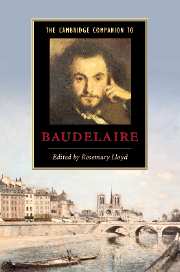Book contents
- Frontmatter
- 1 Charles Baudelaire, a life in writing
- 2 Baudelaire’s politics
- 3 Baudelaire’s poetic journey in Les Fleurs du Mal
- 4 Baudelaire’s versification: conservative or radical?
- 5 The prose poems
- 6 Baudelairean ethics
- 7 Baudelaire’s Paris
- 8 Baudelaire and intoxicants
- 9 Art and its representation
- 10 Music and theatre
- 11 Baudelaire’s literary criticism
- 12 Baudelaire’s place in literary and cultural history
- 13 A woman reading Baudelaire
- 14 Translating Baudelaire
- 15 The stroll and preparation for departure
- Afterword
- Appendix Titles of individual poems and prose poems referred to in the text
- Guide to further reading
- Index
- Index to Baudelaire’s works
- Series list
4 - Baudelaire’s versification: conservative or radical?
Published online by Cambridge University Press: 28 August 2006
- Frontmatter
- 1 Charles Baudelaire, a life in writing
- 2 Baudelaire’s politics
- 3 Baudelaire’s poetic journey in Les Fleurs du Mal
- 4 Baudelaire’s versification: conservative or radical?
- 5 The prose poems
- 6 Baudelairean ethics
- 7 Baudelaire’s Paris
- 8 Baudelaire and intoxicants
- 9 Art and its representation
- 10 Music and theatre
- 11 Baudelaire’s literary criticism
- 12 Baudelaire’s place in literary and cultural history
- 13 A woman reading Baudelaire
- 14 Translating Baudelaire
- 15 The stroll and preparation for departure
- Afterword
- Appendix Titles of individual poems and prose poems referred to in the text
- Guide to further reading
- Index
- Index to Baudelaire’s works
- Series list
Summary
Rhetorical and prosodic systems are not arbitrarily invented tyrannies, but a collection of rules determined by the way we as spiritual beings are ourselves organised.
[Les rhétoriques et les prosodies ne sout pas des tyrannies inventeés arbitrairement, mais une collection de règles réclamées par l’organisation même de l’être spirituel.
(OC ii 626–7)]Writing to Paul Demeny, some ten years after the publication of Les Fleurs du Mal, the sixteen-year-old Rimbaud hailed Baudelaire as 'the first of the visionaries, the king of poets, a true God' but nevertheless impatiently attacked what he saw as the master's formal conservatism: 'But he lived in a milieu that was too concerned with “art”; and his much vaunted form is paltry: the unknown and its inventions demand forms that are new.' In striking contrast, Baudelaire's poetic contemporaries Banville and Gautier were undisturbed by the challenging nature of Baudelaire's content, but, in line with the thinking of mid nineteenth-century theoreticians of versification, were worried by his habit of contesting the 'rules' of traditional French verse, notably those of the sonnet. Banville set out his views on versification in his Petit Traite de poesie francaise (1871). Baudelaire's, characteristically, must largely be deduced from his actual poetry. He declined with mingled fatigue and irritation to reveal 'the backstage mechanics . . . all the horrors of the sanctuary of art' ['le mecanisme des trucs . . . toutes les horreurs qui composent le sanctuaire de l'art' (OC I 185)] to an unschooled and indifferent public, but the broad lines of his 'philosophy of composition' do nevertheless emerge, albeit in fragmentary fashion, in the preface drafts for Les Fleurs du Mal, in Mon Coeur mis à nu and Fusees, and in his critical writings. Here he praises the Romantic writers of the 1820s and 1830s for their imagination, whilst criticising them for the laxity of their expression, and congratulates their 1840s and 1850s successors of the 'art for art' school for making beauty, not morality or truth, the goal of art, whilst castigating them in their turn for making technique an end in itself.
- Type
- Chapter
- Information
- The Cambridge Companion to Baudelaire , pp. 51 - 68Publisher: Cambridge University PressPrint publication year: 2006



